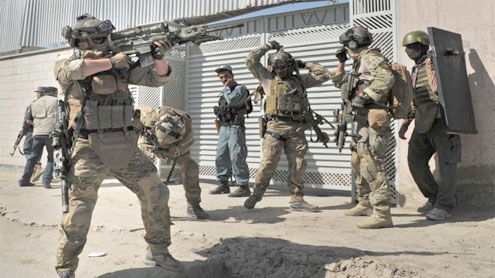
Taliban insurgents launch multiple attacks on Afghan cities. Ben Farmer reports from the ground in Kabul on a day of turmoil for the war-wrecked nation.
When Mohammad Zakir saw several Kalashnikov-toting men leap from an expensive-looking car in Kabul’s diplomatic enclave, he assumed it was just another Afghan powerbroker’s retinue of bodyguards.Seconds later the car mechanic was sprinting for his life after the gunmen who had emerged from behind the 4×4 vehicle’s tinted windows readied their assault rifles, opened fire on a group of nearby police officers and headed for a nearby construction site from which they would unleash the latest wave of terror on Afghanistan’s capital.
The gunfire which soon echoed across the city came as a stark interruption to a balmy spring day and heralded the beginning of an audacious nationwide assault, the largest in 11 years, which saw the Taliban declare the beginning of their “spring offensive” and suicide attackers again penetrate the most fortified districts of the city.“I saw one Afghan intelligence officer shot. He just fell to the ground where he was,” Mr Zakir, 27, told The Daily Telegraph on Sunday in the chaotic aftermath of the attacks. “I turned and ran and got away. Nine of my staff are still trapped in the garage though and I don’t know if they can get out.”
The first sign of the onslaught for those Kabul residents lucky enough not to be in the immediate line of fire was the rattle of sporadic shooting and then a volley of explosions which rumbled through the Wazir Akbar Khan diplomatic district at around 1.45pm. It soon emerged that the four heavily armed men Mr Zakir had seen had stormed a nearby half-built tower block and were using it as a base from which they could launch a rocket and machinegun assault on the diplomatic residences and luxury hotels below.
Cars and pedestrians quickly deserted the main thoroughfares as shots crackled above their heads and smoke rose from buildings struck by rockets. The British and German embassies, as well as a Nato base in the district, were all hit. As The Daily Telegraph reached the scene, soon after the attack began, back streets were filling with Afghan commandos and snipers.Commandos could be seen creeping along the balconies of adjoining buildings as they manoeuvred into position to fire on the attackers. By last night however, many hours after the attack began, the tower was still under siege.
The attack was one of the most brazen assaults on the Afghan capital in more than 10 years since the American-led invasion.In total, fighters armed with machine guns, rockets and suicide vests struck eight sites across Kabul and three provincial capitals outside the city. Some of the attackers were dressed as women in burkas.One target in Kabul was the Afghan parliament building where several MPs and their bodyguards told how they were forced to join forces with police officers to repel the attackers.“I shot up to 400 or 500 bullets from my Kalashnikov at the attackers,” Mohammad Nahim Lalai Hamidzai, an MP from Kandahar said. “They fired two rocket-propelled grenades at the parliament. The fight was around the parliament, the Russian Embassy and Vice President Khalili’s house.”
Simultaneous assaults were meanwhile launched in three other cities in the east, as a Taliban spokesman boasted the militants could “attack anywhere we want”.“These attacks are the beginning of the spring offensive and we had planned them for months,” Zabihullah Mujahid said.He claimed it was revenge for the burning of Korans in February at an American air base north of Kabul and the massacre of 17 civilians by a rogue US soldier in Kandahar. More violence would follow.
As night fell, fighting continued in at least two places in Kabul and the evening calls to prayer were punctuated by occasional explosions or shots.Nineteen insurgents died in the encounters across the country and two were captured. Fourteen police officers and nine civilians were wounded, the ministry of interior said.The Foreign Office in London said British embassy staff had all been accounted for, but were locked down in the embassy grounds.William Hague, the Foreign Secretary, said: “The Afghan National Security Forces responded to the attacks bravely, promptly, and effectively, once again illustrating the significant progress that has been made in ensuring that Afghans can look after their own security.
“Britain stands with the government and people of Afghanistan as they work to build a peaceful future.”Sunday’s attack appeared to undermine Nato’s assertion that it has broken the back of the Taliban-led insurgency to the point where it is incapable of launching a coordinated offensive.There will also be concern that heavily-armed militants managed to penetrate the capital’s “ring of steel” and seize building sites in a repeat of tactics used to attack the American embassy in September.
Despite the scale of Sunday’s attacks, the Nato coalition tried to dismiss them as “largely ineffective” and said they proved the Afghan forces would soon be ready to take charge of securing the country.Gen John Allen, commander of the coalition, said he was “enormously proud” of how the Afghan forces had performed.And Ryan Crocker, the American Ambassador, said: “We’ve seen a very professional performance by Afghan security forces. They are able to deal with events like this on their own.” – Thetelegraph












